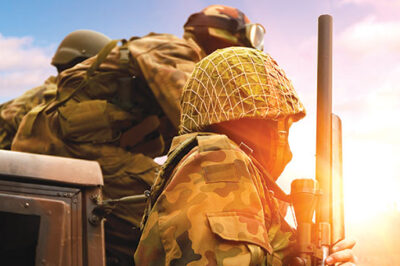The great faith hall of fame, Hebrews 11, indicates that spiritual faith accomplishes incredible physical feats: from walls collapsing to waters parting, from conquering kingdoms to quenching fires and dodging swords—yes, even to the specific point of violent physical combat and becoming “mighty in war and putting foreign armies to flight” (see Heb. 11:34).
It seems reasonable, therefore, to conclude that spiritual warfare and physical combat are essentially two sides of the same coin. The physical is an expression of the spiritual. The material world, including combat, is an expression of the realities of the spiritual world. It seems that the heroes of our faith, this “great cloud of witnesses” surrounding us (Heb. 12:1), saw little difference between the two worlds and warfare. The unchanging principles of “justice and righteousness” rule over conflict in both the physical and spiritual realms.
Perhaps it is this singular reality—the blending of the two worlds—that is part of the reason God chose to describe the heart of one of the Bible’s greatest spiritual heroes and most physical warriors—King David—as having “a heart of integrity” (see Ps. 78:72). David’s heart is described as a singular whole. It was an integer, an undivided unit. For David, the world of swords, caves, blood and battles was one with his world of worship, fellowship with God, and spiritual health. Is this not why David exulted, “For by You I can run through a troop, and by my God I can leap a wall” (Ps. 18:29).
Perhaps a similar parallel is seen in 1 Chronicles 11 and 12, which list the unit rosters of Israel’s greatest warriors in David’s army. Certain phrases are repeated throughout these warrior-chapters. These phrases seem to bear an intimate relationship—”mighty men of valor” and “according to the word of the Lord” are two such phrases. Valor and God’s truth are related. It seems a major point of the chapters is to indicate that “right makes might.”
The closing chapters of the last book of the Bible, the Revelation of Jesus Christ, suggests similar parallels in the worlds of spiritual warfare and physical combat. Revelation 19:11 reads: “And I saw heaven opened, and behold, a white horse, and He who sat upon it is called Faithful and True, and in righteousness He judges and wages war” (emphasis added). The immediate context is clearly one of extremely violent physical combat. But the larger context, the conclusion of all of Scripture, is clearly the conclusion of the entire spiritual history of Scripture. In the end, the King of heaven and Lord of lords brings earth history to a spiritual and physical conclusion in the same context of battle, both spiritual and physical.
Spiritual warfare in your life and mine is governed by the same principles that directed the lives of the heroes of the faith who have gone before us. Warfare, whether spiritual or physical, is to be waged in righteousness and justice.
Warfare is as old as the human race and will be a constant condition as long as men govern themselves. Given such a prevalence of war, one will find all sorts of views on warfare among the nations and societies on earth. Those views range from total pacifism to extreme and open aggressiveness.
Into this mix, philosophers for millennia have debated the concept known as just war—war that is considered morally justified. They’ve developed myriad matrices and identified various characteristics that supposedly identify and differentiate between just and unjust wars.
Despite their considerable pontification on the subject, philosophers aren’t necessarily the best judges of what makes a war just. Instead, the warrior who’s actually doing the fighting will often have the better perspective. The warrior sees war with a proximity neither academics nor the media are regularly exposed to. The warrior has a unique perspective of the nature of warfare and can be a better judge of what makes war just.
The concept of war is clearly biblical, as there are many references to it in the Scriptures. Furthermore, as we read in the book of Exodus, “The Lord is a warrior; the Lord is His name” (Ex. 15:3). And Revelation 19 describes a scene where Jesus Himself returns to the earth as a warrior, leading a great army to finally destroy His enemies.
Until Christ returns to bring His peace to all mankind, nations will continue to experience or be threatened by warfare, just as they have been since the fall of humanity. So the issue continually confronts us: When is war justified? When is it acceptable to engage in war, and when does God Himself sanction war? It is a question that will never leave us, particularly in our day of global terror. And it is a question every Christian must ask in his or her own soul. What will you do when war—spiritual or physical—comes to your home … or your homeland?







Leave a Comment
You must be logged in to post a comment.